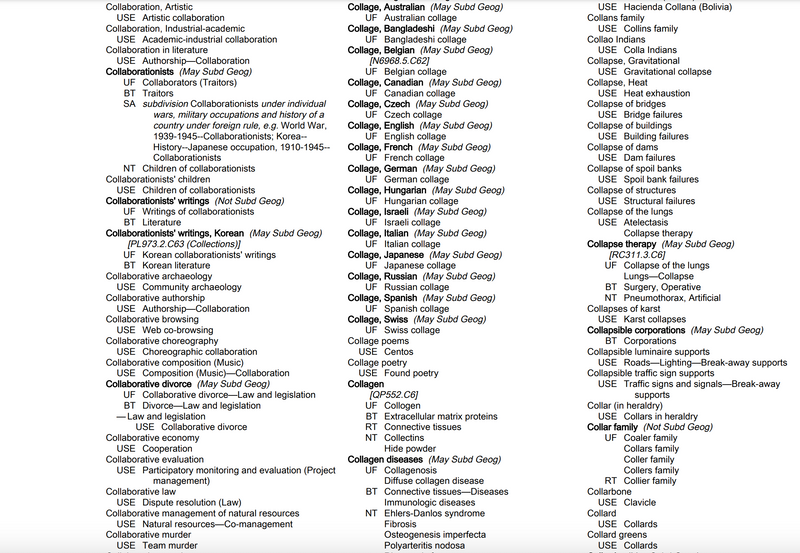Research and Information Services, Spring 2021: Collaboration at the Core

I'm always interested to see how concepts or terms are represented, or not represented, by Library of Congress Subject Headings, the official indexing language used to catalog books in most academic libraries, and I find it striking that there is no LCSH (see above) directly correlating to the idea of collaboration as such. Although the word or some version of it appears in a number of other subject headings, its absence among LC terms is notable, if not necessarily significant.
I do think it worthy of note how central collaboration is in the delivery of services to our users, and in fact in all aspects of the facilitation of research in which we're involved. A good example of a joint effort between librarians was a consultation with a faculty member and his fellow researcher from another institution that my colleague Rachel Altvater, our Assistant Research and Information Services Librarian, and I provided together. This was an instance where, though I was able to provide some general suggestions on search strategy, Rachel's background in and familiarity with key aspects of the study of children's literature were crucial to our input on the central subject of the scholars' research: the representation of race and gender in images and text of children's books. Rachel's knowledge of relevant professional organizations and publications was of particular value to our consultees.
I feel in general that my most successful consultations are ones in which I find myself learning along with the researcher, in which our exploration of resources and approaches to searching are very much a cooperative effort. I also feel that, in presentations to classes, the most effective and satisfying are ones in which the instructor and I collaborate in highlighting and demonstrating the use of resources most valuable to the students.
Finally, and almost needless to say, collaboration among library staff members is really at the heart of service delivery to the academic community. Our library is a tight-knit group, and I am pleased to say that our joint commitment to excellence in fulfilling the needs of students, faculty, and researchers is unquestionable and (in my humble opinion) exemplary.
My colleague Rachel has written the following about virtual meetings with students that she hosted during the past semester:
"Consultations this spring have ranged from general research assistance and supplements to programs offered by the library (cited reference searching, citation management, conducting literature reviews and scoping reviews/compiling annotated bibliographies, beginning doctoral studies) to more specific subjects. Participants in consultations hailed from many cities, states, and time zones, some even moving houses or overcoming winter storms and power outages to continue their studies. Our students' perseverance and curiosity are honorable.
Subjects include (but are not limited to):
- Informal learning and medical student success
- Perspectives on long-term care from LGBTQ+ elders
- K-12 art education, art integration, and Black feminist theory
- Social cohesion in classrooms for Syrian refugee and Turkish national students
- Content analysis of social media posts and communication across ages and genders
- Impacts of play (especially with tie-ins to characters in children's media) on English acquisition in young second language learners
- Sleep and weight loss
- Art therapy, art education, and parental alienation
- Diet and ADHD interventions
- Abstract art, critical race theory, and culturally relevant pedagogy
- Attitudes of educational leaders in Latino school districts in Connecticut and implications of Latino critical theory
- Student centered approach in primary education in Myanmar
- Anxiety and autism
- Adolescents coping with loss of siblings due to suicide
- The history of NCTE and TESOL
- Student misconceptions in learning mathematical functions
- Technology and art education
- Science education for students with physical disabilities
- Imaging for executive function and brain activity in youth"
Picking up on Rachel's characterization of Teachers College students' honorable perseverance and curiosity, I am pleased to find that I wrote the following in my Fall 2020 semester report (subtitled "Together in a Sudden Strangeness"): "What is not strange, but heartening and affirming, is the resilience of the College and and its students and faculty, and their commitment to the critical inquiry and scholarship at the heart of their endeavor . . . " Getting through this academic year has been a valiant collaboration, on all levels, among members of the Teachers College community, and the striking diversity and depth of our students' scholarly explorations, despite the challenges that have confronted all of us, is a tribute to their, and our, having prevailed in the face of a number of pandemics, including (but not limited to) the novel virus; including (see Charles Dickens) the older viri ignorance and want, and including all the ills of the world that we of this community are called upon, and honored, and grateful to address. Here is a sampling of the explorations with which I've been privileged to assist:
- seeking research literature on developing and evaluating school district superintendents and charter management organization directors
- the question of whether ELL students are less likely to attend 4-year colleges than their non-ELL peers
- research on anxiety levels in nursing students and plan to use the STAI by Spielberger; seeking original work by Spielberger and his colleagues from the 1973 and 1980s
- seeking newspaper articles that discuss race in schools preferably dating from 2020 going back to 2018
- evaluating the effectiveness of Teaching Food & Nutrition for All (TF&N4A) is an asynchronous, online, professional development course designed for school teachers
- research on child maltreatment and long-term health outcomes, and whether populations from urban areas face greater health disparities than victims living in rural areas
- help conducting a scoping review on the effects of physical activity and diet on the prevention and management of diabetes in adults
- finding qualitative research in art education using critical race theory or culturally relevant pedagogy concerning how we have conversations around censorship or banned/taboo topics with students, parents, and administration (2/25/21)
- seeking ethnographic work on demographic factors correlating with Hispanic-Latino conservatism as well as discussion on the Hispanic-Latino panethnic label
- assistance with a systematic review evaluating the effects non-invasive brain stimulation (NIBS) on the upper limb in children with cerebral palsy (CP) and to examine the protocols for stimulation administration
- assistance with a scoping review on the relationship between sleep quality and sleep duration associated with weight loss among adults
- research on unit-based education and its effect on nurses' anxiety, self-confidence, clinical performance, and patient satisfaction
- assistance with a scoping review on how school-based interventions influence eating habits and facilitate the increase in fruits and vegetables consumption among American students between ages 5 and 18
- seeking instruments to measure nurses' perception of and satisfaction with auditing systems
- seeking research on teacher preparation for adolescent teachers in dance
- seeking research on the impact and benefit of executive coaching on Black employees moving into leadership roles
- seeking to determine how experiences help students when they are writing stories in their playwriting class, and how teachers guide students in digging into their experiences and applying experiences to write good stories
Finally, these are some basic statistics on research and information services delivered to students, faculty, and researchers during Spring 2021:
- Librarians answered 655 queries submitted via the library's email Ask a Librarian ticket system; these included reference and information questions, requests for one-on-one research consultations, questions concerning access to the library's physical space and the possibility of borrowing or returning print books in the collection, and were additional to queries fielded by Services Associates, all transacted virtually through the email query and live chat service options.
- Research and information services librarians provided 52 research consultations to individuals or small groups during the Spring.
- Library Services presented 5 virtual course-specific library information sessions for a total of 64 students.
Image source: Library of Congress Subject Headings PDF Files
(https://www.loc.gov/aba/publications/FreeLCSH/freelcsh.html)

